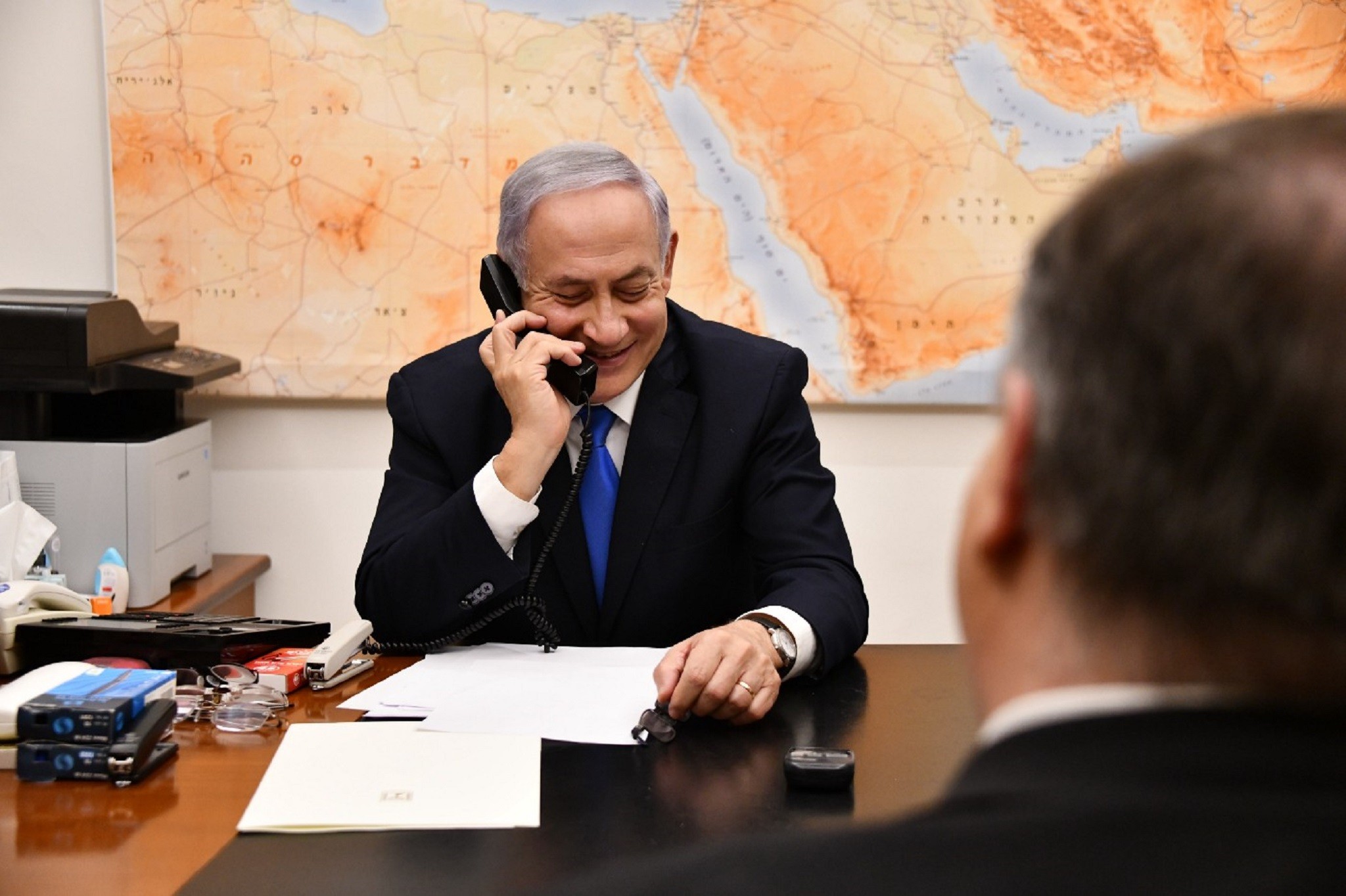His supporters are celebrating today as Netanyahu becomes the longest serving PM in Israel’s history. His political opponents are less enthusiastic.

U.S. Secretary of State Michael R. Pompeo and U.S. Ambassador to Israel David Friedman join Israeli Prime Minister Benjamin Netanyahu on a phone call to President Donald J. Trump in Jerusalem, Israel on March 21, 2019. [State Department photo by Ron Przysucha/ Public Domain]
What is next for Israel?
The tiny nation of Israel has experienced substantial economic growth in the past decades. It has also moved to the forefront of the technological revolution, becoming an angel investor and incubating start-ups.
In the past decade, under Netanyahu’s leadership, Israel has cemented its well-earned reputation as the “Start Up Nation.” Israel gave the world Waze (thank you). Israel is going to the moon.
Under Netanyahu’s watch, something else has been happening, too; Middle Eastern nations and their leadership have been gradually softening on Israel. Though much of the credit doesn’t belong to Netanyahu, his diplomatic style and business-minded policies have helped Israel get a foot in the door of international politics, if not a seat at the table.
Israel’s Arab neighbors, predominantly Muslim countries, are experiencing a true paradigm shift. The lure of the global marketplace and its many economic benefits is partly responsible for the change in attitudes, but Middle Eastern nations have other, and far more deadly, incentives to accept Jews in Israel.
The threat of radical Islamists in the region, most particularly those receiving the financial support of Iranian authorities, has been ever growing. The death toll of Muslims killed by their fellow co-religionists who have perverted the peaceful faith of Islam continues to mount.
Increasingly, Middle Eastern countries are far more afraid of Iran, and a nuclear Iran at that, than they are of Israel.
Israel is an absolutely crucial component in the fight against Iran’s Ayatollah, and Israel is helping shoulder the burden of keeping radical terrorists at bay. The governments of Middle Eastern countries are beginning to accept, if gradually and grudgingly, that their conflict against radical Islamists cannot be won without the full cooperation of Israel.
It is perhaps for this reason, far more than the diplomatic chops of Israel’s current Prime Minister, that the thaw in relations between Israel and it’s Muslim neighbors has occurred.
Still, there is a certain percentage of political success that involves simply being in the right place, at the right time, and not messing it up. Former U.S. President Ronald Reagan didn’t tear down the Berlin Wall with his own two hands; but he played a role, and he deserves the credit. As does Netanyahu deserve credit for his role in bringing Middle Eastern leaders to the point of willingness to negotiate with Israel.
Be it the fall of the Berlin Wall or achieving more peaceful relations between Israel and it’s neighbors, there is more than enough credit to go around.
Netanyahu can also truthfully boast about his relationship with U.S. President Donald Trump. Since taking office, Trump has taken an unexpectedly strong stance in support of Israel, and Israeli Prime Minister Benjamin Netanyahu.
With moving the U.S. Embassy to Jerusalem and officially recognizing Israeli sovereignty over the strategically important Golan Heights region, Trump has sent a clear message to the international community that Middle Eastern nations can count on the U.S. to support Israel. Both actions drew sharp criticism from groups supporting Palestinian claim to the state of Israel.
But the two surprise moves caused very little backlash in the international community. The U.S. policy toward Israel during the Obama years was to “let a little light” between the two allies. It was hoped that this policy would improve the U.S. position in negotiation with other Middle Eastern nations.
Somewhat surprisingly, it appears that Trump’s strategy of honestly acknowledging what the U.S. and the international community, including Middle Eastern leaders, have long known; as far as the U.S. is concerned, Jerusalem is the capital of Israel, and Israel holds the Golan Heights.
Trump’s $50 billion dollar investment and economic peace plan, unveiled in June, is sure to soften Israel’s neighbors even further. A stronger partnership with Western trading partners and interest from foreign investors may be an offer Middle Eastern nations can’t refuse.
Netanyahu’s political opponents may continue to gnash their teeth at his successes; but Israel’s progressive left has taken a backseat, albeit temporarily, to the economic powerhouse policies of a conservative pro-business government with a strong personality like Netanyahu at the head.
As Prime Minister Benjamin Netanyahu celebrates his historic milestone, and as Israel continues to move to the forefront of technology, ecology, environmental science, clean energy and water desalinization, the world watches to see what amazing thing the Start Up Nation will dream up next.
(contributing writer, Brooke Bell)